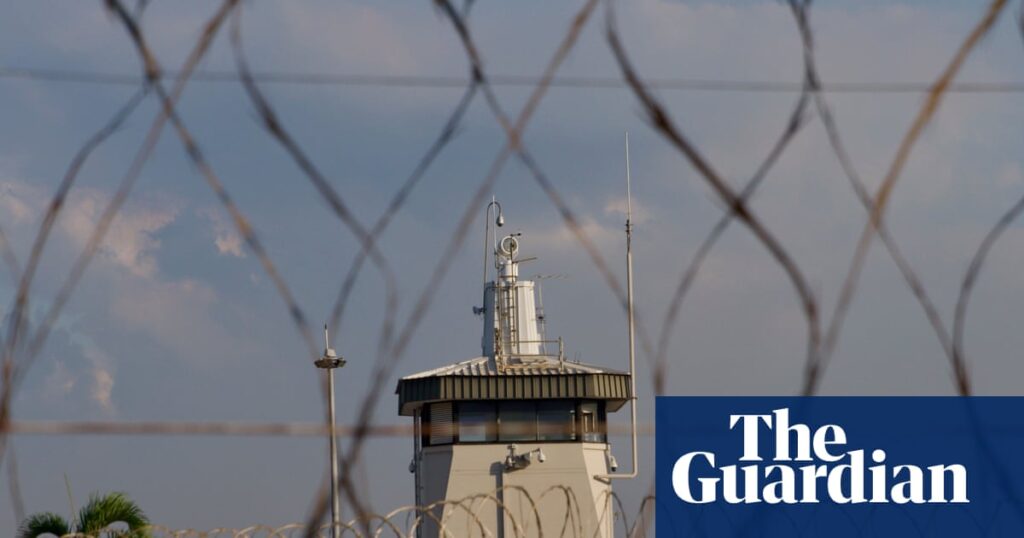A young Aboriginal person detained at the Don Dale detention centre was kept in isolation for 84 hours, unable to leave their cell or make contact with any support person, and was denied food for some of that time as a coercion tactic by officers, an investigation by the Northern Territory’s Office of the Children’s Commissioner has found.
The investigation examined an incident that took place in April 2024 at the notorious youth detention facility in Berrimah in the NT, which saw a young detainee held in a cell after refusing to move from one cell block to another.
The OCC report, tabled in the NT parliament on Thursday, found that officers had exceeded the maximum time a young person could be held in isolation by 12 hours.
“It was unacceptable and unlawful that a young person is isolated within their cell for 84 hours continually, in breach of the minimum standards expected by international law and the requirements under the Youth Justice Act, regulations and associated policies and procedures,” the report said.
The report said that officers had failed to properly monitor and report on how long the young person had spent in isolation, which contributed to them being held in isolation for longer than legally allowed “without notification or awareness of the OCC, CEO or even apparently the Superintendent”.
In addition, the report said that the young person had been denied food for some of the time they were held in isolation, despite the detainee making several intercom calls to staff asking for food.
Sign up: AU Breaking News email
A transcript of a recorded intercom call to staff, included in the report, shows the inmate asking for a Vegemite sandwich at about 10.30pm.
An officer replied: “No, I can’t do that, we’ve already spoken about this … You know the deal … If you move to Bravo [block] I’ll feed you until your [sic] fuckin full. But I can’t.”
Later, the staff member tells the young person: “I’ve got your medication here. I’ll give you food. But you need to go to Bravo.”
Records show the detainee did receive Weet-Bix and possibly an apple during that day, but had not eaten breakfast or lunch.
Staff members interviewed for the report said that the decision not to provide the young person with food at such a late hour was because it was outside normal meal times.
“The decision of the Team Leader not to allow food to be provided after hours, unless moved, amounts to prohibited actions contrary to section 153 of the Youth Justice Act noting that the Team Leader conceded the refusal for food related to refusal to move blocks, and not any perceived risk to [the young person] or to staff,” the investigation found.
The OCC investigators also examined claims that the young person had been denied their medication, but found there was “insufficient evidence to conclude that medication was withheld due to inadequate record keeping”. It added that it was clear that staff “refusal to provide medication after hours was being used as a strategy to coerce [the young person] to move blocks”, which investigators said was also a prohibited action.
The report acknowledged staff were operating in “difficult conditions” after a major disturbance that involved rooftop protests and significant property damage, including by fire, earlier that month.
It also noted that staff had concerns that the young person had a weapon in his cell and that contributed to their decisions around their care.
after newsletter promotion
The young person, the report said, “has a well-documented history of traumatic childhood experiences with associated mental health concerns including a history of self-harm within detention”.
However, the investigation found that the young person had handed in a weapon to officers early in their time in isolation and that after this point, the existence of a weapon in the room was “not corroborated by an incident report/records nor reflected in the conduct or actions of [youth justice officers] on the block”.
“Moreover, it is concerning that a young person with known self-harming history in detention would be left alone in their room with an alleged weapon without any intervention from staff,” the report said.
The young person at the heart of the case said, in a statement released via the North Australian Aboriginal Justice Agency (Naaja): “It really messed with my head. I started stressing more … it affected me and I couldn’t think straight because of what happened. It made my anxiety worse. It changed me.”
The NT Department of Corrections accepted two out of five of the report’s recommendations and said it was implementing some changes in response to them, including around rostering and signage, but did not accept other recommendations around food service, administering medication after hours and procedures regarding the detection of weapons.
Naaja, which brought the young person’s complaint to the OCC, welcomed the findings of the investigation but said that “little has changed” since the royal commission into the protection and detention of children in the NT identified these same problems in 2017.
“This report demonstrates entrenched systemic issues that continue to be driven by staff shortages, repeated lockdowns and detention centres at or near capacity,” a Naaja spokesperson said. “Aboriginal young people, who make up around 90% of those in detention, continue to bear the brunt of these failures.”
In Australia, the crisis support service Lifeline is 13 11 14. Indigenous Australians can call 13YARN on 13 92 76 for information and crisis support. Other international helplines can be found at befrienders.org

